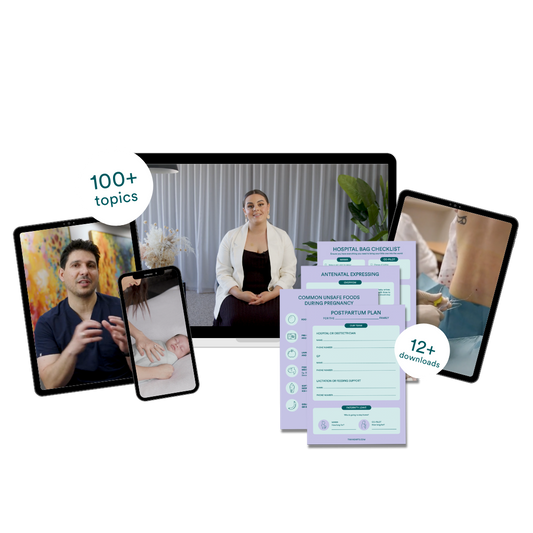 Co-written by Dr. Mariam Chaalan @ask.the.dr
Co-written by Dr. Mariam Chaalan @ask.the.dr
With winter in full swing, and kids playing pass the parcel with some pretty contagious bugs, it’s safe to expect your child will catch a respiratory tract illness. For most healthy children this will present as your typical cold and flu symptoms which will generally subside, and the child’s health will improve in a matter of days. However, some respiratory viruses can cause more serious illness, especially in very young children and those with chronic medical conditions. Children can deteriorate quite rapidly, and care may need to escalate in a timely manner.
With many doctor visits – whether it be your local doctor, your Emergency Department or even being discharged following a hospital stay, there is a parent or carer who leaves feeling unheard. There is nothing more daunting and gut wrenching than being sent home with a sick child you feel has not been given the time, attention, or appropriate care that they deserve.
In Australia, we are fortunate to have a solid health care system. However, things can get missed and it’s important as parents and carers that you become experts in advocating for your child.
How to advocate for your little one
While doctors and nurses are best equipped to diagnose, manage and treat your child, never underestimate the power of that gut feeling – a parent’s intuition is what I call the sacred sixth sense.
As a parent or carer, you are the expert on your child. You know your little one well enough to know what is and does not seem right or ‘normal’ for them. So, if you believe your child needs a fresh set of eyes and ears because your medical team might be missing something, it is absolutely your right to request it.
Questions to ask the treating team
Once the doctor has examined the child, they will discuss the findings with you and discuss a management plan. It is important to consider asking the follow questions:

*This is important as unfortunately imaging can be forgotten to be ordered or it can be triaged. If you are aware your child is due for a test and this hasn’t been done, you can advocate for your child and ask the staff through the course of the day the time it has been booked to ensure it will happen.
You are your child's number one advocate
You are an equal partner in your child’s care I know that as a parent in the healthcare setting it can seem daunting, and we think “I don’t want to say anything, they know best” or “I don’t want to come off too pushy.” When I first had Nala I didn’t view myself as an equal partner in her healthcare. I would take her to the doctors and after a few times, I noticed that health care professionals actually highly respect the insight and opinion that you as a parent bring.
You are the one who knows your child best.
But something a lot of parents aren’t confident in is communicating effectively to health care professionals, and being able to describe what you’re seeing and what is concerning you. That is why doing a first aid course specifically for infants and children is so powerful. If you're not getting the right response, or you’re not being taken seriously, you’ve got the education to back up what you’re saying. You can chat with the doctor and say “these are the red flags I’m seeing” and “this is what is concerning me.”
Trust me, you will get a lot of respect for that. Don’t forget, you are your child’s number one advocate.
Your gut instincts are real: Ryan's Rule
Ryan Saunders was nearly 3-years-of-age when he tragically died following a misdiagnosis of a likely treatable illness. His parents did not feel the staff acknowledged their concerns that Ryan was quickly deteriorating. Despite their pleas for action, Ryan died just over a day after being admitted. He had a bacterial infection that had developed into toxic shock. It could have been detected. It could have been treated.
Ryan's family campaigned for a change to the ways parents can advocate for their children in healthcare and in 2013 Ryan's Rule was introduced in Queensland, giving every parent the right to access a clinical review of their child's treatment in a timely and simple way.

NSW has a REACH program that helps parents and carer/s to escalate their concerns with staff about worrying changes in a child’s condition. It stands for Recognise, Engage, Act, Call, Help is on its way.
It encourages parents to ‘recognise’ when something isn’t right with their child or the care their child is receiving. Then they are asked to ‘engage’ with treating doctors and nurses to make their concerns clear. If they are still not satisfied, parents can ‘Act’ which involves asking the nurse in charge for a ‘clinical review’. If they are still worried, they are advised to call the hospital's REACH number.
In WA, there is the Aishwarya's CARE Call process available in all WA public hospitals to use if you are worried that your child's condition is becoming worse while in hospital. If your concern is urgent, use the Aishwarya's CARE Call phone or call 6456 0337.
In ACT, the Canberra Hospital has a Patient and Family Escalation Process and Call and Respond Early (CARE.) After calling a CARE Responder reviews the patient within 10 minutes, addresses your concerns, refers and liaises with other clinical staff as appropriate and provides feedback.
In Victoria, SA, NT, WA or TAS patients can ask to speak to patient liaison officers at individual hospitals to escalate their own or family members’ care.
Regardless of your state – regardless of whether you are a hospital inpatient, in the emergency department or have seen a GP, you have the right to express your concerns. You have a right to ask for a second opinion.
You should always follow your instincts and exercise this right whenever you are not satisfied with a diagnosis or treatment plan. It is important to note these services should only be used for concerns related to the care of the child and concerns for their health. They are not to be used for general complaints.
Knowledge is power
And most importantly empower yourself with knowledge on what is normal and what is not. Parents and carers are ideally placed to identify signs of early signs of clinical deterioration because they spend the most amount of time with the child, providing additional surveillance.
Having this knowledge also gives you the confidence to escalate the care when you know it is appropriate. It makes you more comfortable and confident in knowing when to take your child to ED as opposed to the local doctor. There is nothing more important and responsible than a parent having this knowledge and knowing how to apply first aid. The Tiny Hearts first aid course, is a comprehensive course that will leave you equipped and empowered to advocate for your child.
Providing a process for patients and carers to escalate care provides an additional safety net and recognises the role of patients and carers as part of the wider healthcare team. If you are turned away or dismissed, continue to pursue it. Many children’s lives have been saved thanks to a parent or carer who followed their gut instincts. That sixth sense is sacred. Nurture it with education.









